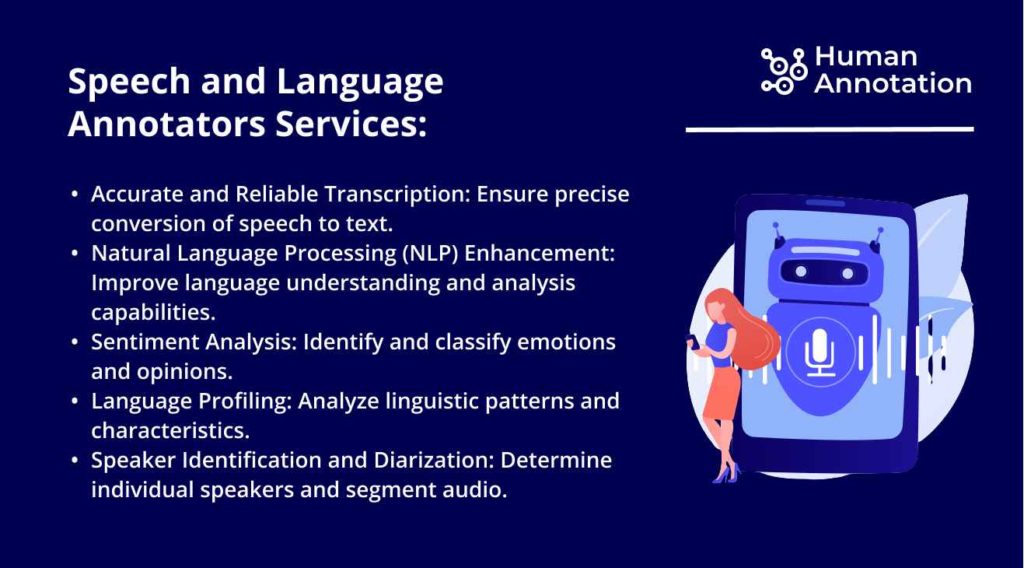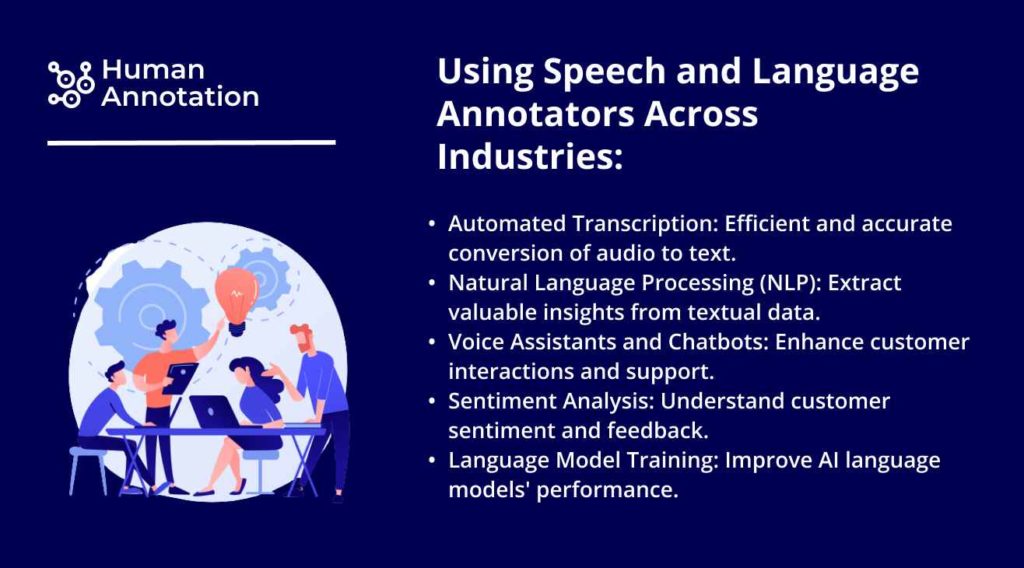
In the realm of natural language processing (NLP) and speech recognition, accurate and comprehensive data annotation machine learning is vital for training robust models and developing advanced applications. This is where speech and language annotators play a crucial role. By leveraging their expertise and knowledge, businesses can unlock the potential of NLP and speech recognition technologies. Let’s explore how to effectively use speech and language annotators for accurate data labeling.
The Power of Speech and Language Annotators
Speech and language annotators are skilled professionals who specialize in the analysis and annotation of audio data, transcriptions, and linguistic nuances. They bring a human touch that is essential for capturing the intricacies of spoken language and ensuring high-quality data labeling. Here’s how businesses can effectively utilize their expertise:

Speech Transcription and Text Annotation
Speech and language annotators can transcribe spoken language into text with exceptional accuracy. This process involves converting audio recordings, such as interviews, voice notes, or call center conversations, into written transcripts. These annotated transcripts form the foundation for various applications, including speech recognition systems, voice assistants, and sentiment analysis.
Linguistic Annotation and Tagging
Annotators can identify and label linguistic features, such as parts of speech, named entities, syntactic structures, and semantic relationships. This linguistic annotation enhances the understanding and analysis of textual data. By tagging and labeling these linguistic elements, businesses can improve language modeling, text classification, entity recognition, and information extraction tasks.
Audio Tagging and Annotation
Speech and language annotators are skilled in categorizing and labeling audio data based on specific attributes or characteristics. This includes tagging audio recordings with relevant metadata, such as speaker identification, emotions, background noise, or audio events. Accurate audio tagging enables tasks such as audio content analysis, audio recommendation systems, and acoustic modeling.
Deep Learning for NLP and Speech Recognition
The expertise of speech and language annotators is invaluable when working with deep learning models for NLP and speech recognition. They can curate and annotate training datasets tailored to specific applications, including sentiment analysis, machine translation, speech-to-text conversion, and voice-enabled interfaces. Their annotations ensure the training data captures the nuances and complexities of the target language or speech domain.
Using Speech and Language Annotators Across Industries
Speech and language annotators play a crucial role in various industries, leveraging NLP technologies to unlock valuable insights and enhance business operations. Here are a few real-world examples and success stories of using speech and language annotators for NLP across different industries:

Healthcare Industry
In the healthcare industry, speech and language annotators have been instrumental in developing voice-enabled applications for patient care and medical documentation. Annotators transcribe and annotate medical dictations, enabling accurate and efficient speech-to-text conversion. This technology improves the speed and accuracy of medical documentation, enhances electronic health records, and enables voice-controlled interfaces for medical devices.
Customer Service and Call Centers
Speech and language annotators have revolutionized the customer service industry by enabling automated call routing, sentiment analysis, and voice-based virtual assistants. Annotators label and categorize call center conversations to train models that can automatically analyze customer sentiment, identify trends, and provide personalized recommendations. This improves customer satisfaction, reduces call handling time, and optimizes customer service processes.
Finance and Banking
In the finance and banking sector, speech and language annotators contribute to developing intelligent chatbots, voice assistants, and natural language understanding applications. They annotate and transcribe financial call recordings, customer inquiries, and chat interactions to train models that can understand and respond to user queries accurately. These applications improve customer service, automate routine inquiries, and assist in fraud detection and prevention.
Legal Industry
Speech and language annotators are valuable assets in the legal industry, particularly for document analysis and e-discovery. They annotate and categorize legal documents, court proceedings, and depositions, enabling efficient search and retrieval of relevant information. By leveraging NLP technologies, annotators support legal professionals in contract analysis, legal research, and case management, streamlining processes and improving productivity.
Media and Entertainment
Speech and language annotators are instrumental in developing content recommendation systems and voice-controlled media devices. They transcribe and annotate audio content, enabling accurate speech recognition and personalized recommendations based on user preferences. By enhancing content discovery and user engagement, these applications transform the media and entertainment industry, delivering tailored experiences to consumers.
These real-world examples demonstrate the widespread application of speech and language annotators in various industries. By leveraging their expertise in NLP and linguistic analysis, businesses can derive actionable insights, improve customer experiences, automate processes, and drive innovation in their respective domains.
Choosing the Right Speech and Language Annotator Provider
When it comes to speech and language annotation for your business applications, selecting the right provider is paramount. The expertise and quality of the annotator provider can significantly impact the accuracy and effectiveness of your NLP and speech recognition models. To ensure successful outcomes, consider the following factors when choosing a speech and language and pdf annotator provider:
Expertise and Domain Knowledge: Look for a provider with annotators who possess deep expertise in speech and language processing. They should have a comprehensive understanding of linguistic nuances, dialects, and domain-specific terminology. This ensures accurate and contextually appropriate annotations for your specific applications.
Quality Assurance Processes: Ensure that the provider has robust quality assurance measures in place to maintain high-quality annotations. This includes regular feedback, inter-annotator agreement assessments, and continuous training programs to enhance accuracy and consistency.
Scalability and Flexibility: Consider the scalability and flexibility of the provider’s services. They should have the capability to handle both small-scale and large-scale annotation projects, accommodating diverse data formats and annotation techniques. This flexibility ensures that the provider can meet your evolving needs as your business grows.
Data Security and Confidentiality: Data security is crucial when outsourcing annotation services. Choose a provider that prioritizes data privacy and implements stringent security measures. They should have robust protocols in place to protect your sensitive data, including secure infrastructure, encryption, and confidentiality agreements.
Cost-Effectiveness: Evaluate the cost-effectiveness of the provider’s services. While affordability is important, prioritize quality and expertise over low costs. Look for a provider that offers competitive pricing while delivering reliable and accurate annotations.
At Human Annotation company, we understand the significance of these factors and strive to provide exceptional speech and language annotation services. Our team of expert annotators has in-depth knowledge in NLP, speech recognition, and linguistic analysis. We have a rigorous quality assurance process to ensure the accuracy and consistency of our annotations.
Our flexible cooperation models cater to the unique requirements of your projects. Whether you need short-term or long-term annotation support, we can tailor our services to suit your specific needs. We emphasize open communication and collaboration to ensure that we deliver annotations that align with your goals and expectations.


